Have you ever had a Ploughman's? It's really good. Cheddar cheese, pickles or onion relish and, if you're kinky, a pear. It's probably not very healthy, except emotionally. Lovely comfort food.
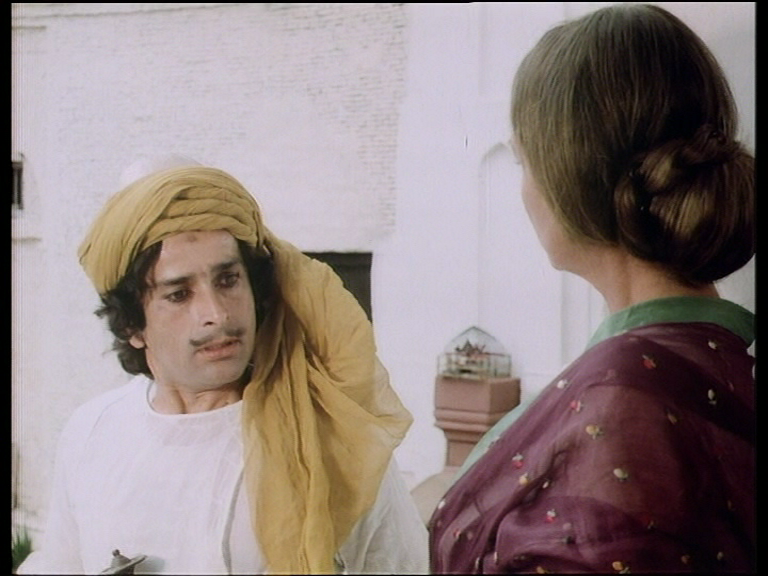
Have you brought me a Ploughman's?
What were we talking about? Oh yes. So Junoon. It was one of the first Hindi films we had seen, we were still virginal viewers. But we did know enough to recognize key figures such as the Shabana, the Naseer, the Kulbhushan (who was still "that guy" back then), the Tom Alter, the guy from Swades (still that guy, unfortunately), and, of course, the Shashi. We were like the proto-PPCCC back then.
(An excellent complement to a Ploughman's sandwich is one of those thick organic fruit drinks.)
Another problem with Junoon, apart from it testing our attention span on an epic scale: we misunderstood who was married to who, and thought "Jennifer Kendal" was actually Nafiza Ali, and so we thought it was doubly interesting that a real-life husband, Shashi Kapoor, should play an obsessed stalker of his real-life wife. How meta!
Until we realized she wasn't his real-life wife. And then we were like, "Lame." Moving on.
The year is 1857, the land is India, the air is as thick as the cheddar slice in my Ploughman's. You could cut it with a knife, and you'd need a pretty sharp knife. On one side, you have the Indians, angry, fomenting rebellion, led by a henna-haired Naseer looking fabulous. On the other side, you have the British, living in a bubble of colonialism and segregation. One day, a super-fine nawab, Javed Khan (Shashi Kapoor), ambled along and spotted a pretty young thing, Ruth (Nafiza Ali), on the British side. Shashi, being Shashi, started junooning up a storm - I must have the saucy wench! Or, as Wayne would say, "She will be mine. Oh yes. She will be mine."
Thanks to Naseer spreading violence, Ruth's father, Mr. Labadoor (Tom Alter! yeah!), is killed, along with a number of other British people. Chaos ensues. The family - Ruth's mother (Jennifer Kendal, THIS is Shashi's wife), Ruth's grandmother - quickly flee with the help of a noble-hearted guy, Noble Guy (Kulbhushan Kharbanda, looking quite handsome). Amidst all this macro tension, Javed the Nawab's micro obsession is growing more and more unwieldy. When he captures the Labadoor family, he practically pops a blood vessel in excitement and declares he will wed little Ruth as his second wife. His first wife (Shabana Azmi) is not so pleased. And his brother-in-law, Sarfaraz (Naseeruddin Shah), is also annoyed at his distractedness.
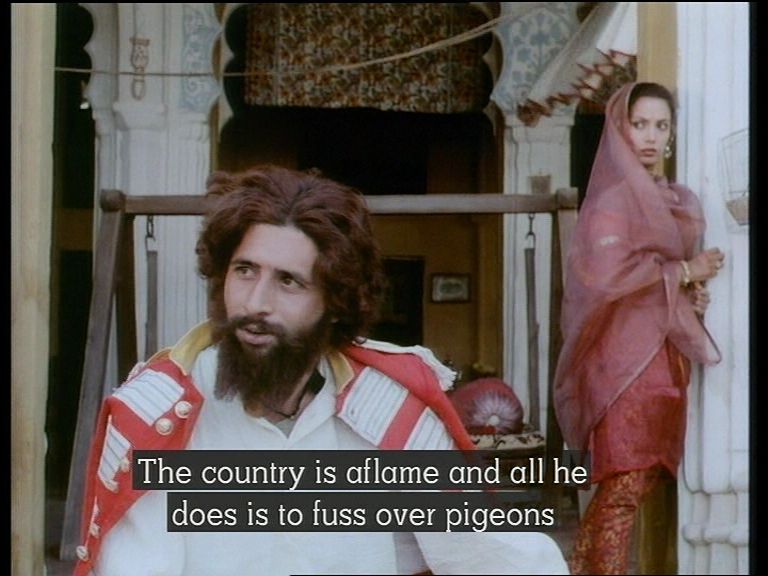
Shashi has a thing for pigeons in such films.
The two families - Indian and British - live in growing tension, with the Shashi's predatory, nearly maniacal desire for Ruth causing everyone much grief. Meanwhile, the storm of the 1857 is growing, and soon the household is sucked in as well.
Junoon is a very cerebral film and, on an intellectual level, it is great. The juxtaposing of this microcosm of Anglo-Indian relations against the macro strife of 1857 is very stimulating; particularly in the eroticization and aggression of these relations, which lead one immediately to think of Edward Said. That is, in Said's Orientalism, he discusses how Orientalism typically defined the "Eastern" male as an effeminate Other, weaker and more passive than his macho Western counterpart. Even today, the PPCC would argue, you still see this theme of virile Western men seducing the exotic Oriental beauty - for example, read Slate's notes on race in Wes Anderson's Darjeeling Limited. Having the genders and power structure reversed - in Eastern Javed's constant attempts at possessing Western Ruth - as well as, all throughout, subverting them - Javed's ultimate vulnerability, his own possession - makes for some great Thinking Person filmmaking.
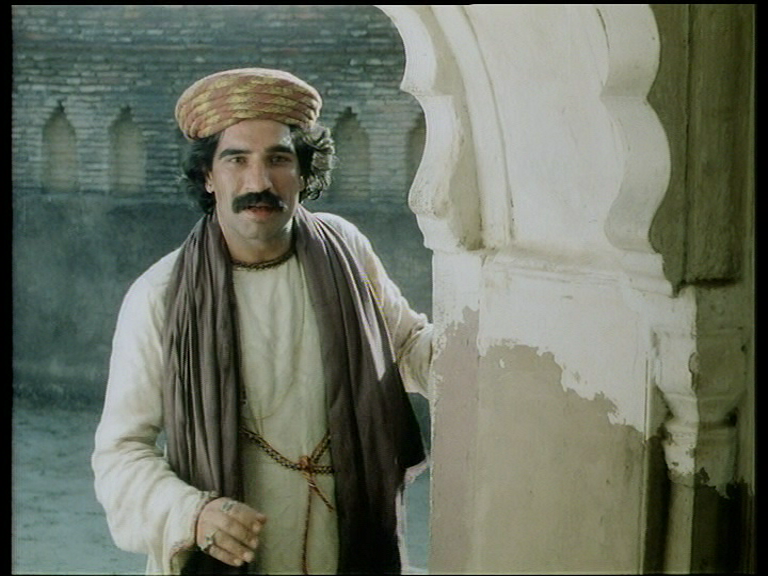
Kulbhushan, so young and handsome!
But what the film has in intellectual terms it lacks in emotional involvement. That is, the PPCC likes a good postcolonial or Orientalism-examining/Orientalism-subverting film as much as the next post-punk, but we are also warm-blooded human beans. While a film like My Son the Fanatic works on both the intellectual and emotional levels, Junoon remains suspended and austere. Partly, this is the fault of the characterizations. The only characters we invest any time in are Javed, Ruth and Ruth's mother. Javed is singularly unlikable, and, as fascinating as he is in a moralistically misshapened Quasimodo way, he's not someone we care about (or, for that matter, want to "win"). He's basically the villain. (Side note: we cannot avoid mentioning that Shashi looked FAAAHine in his nawab get-up. He was lush like the mountains of Switzerland under James Bond's skis. Just luush.) Ruth, the object of his obsession, remains a non-entity - she is given hardly any lines and, apart from fearing Javed and liking pigeons, we get little insight into her thoughts and feelings. As a result, she ends up becoming a symbol and little else. Ruth's mother is perhaps the real hero of the film in that the audience is on her side, and she demonstrates courage and action throughout the film. But, again, she remains blandly straightforward. For a film so loaded with political and cultural potential, it would be good to have a bit of provocation here and there, some graying in the characterizations. Instead, we have exactly what we expect: the savage, obsessed villain, the tremulous damsel, her brave mother.
So, dammit, when the PPCC can't be provoked, it goes a-lookin' for provocation! We tried noticing if, as in Bombay, there would be any prejudices hidden beneath the text. The only things we can come up with are:
- Benegal's treatment of the British characters is mostly sympathetic. OK, Tom Alter's patriarch figure is your run-of-the-mill stern colonialist, but the rest of the family are sinless victims. Most notably: Benegal goes to great pains to humanize the British before their slaughter in the church. There is the goofy guy who keeps peeking over the woman's shoulder. There is the bored, little girl who rests her head on her mother's shoulder. There is the helpful soldier, who indicates to Tom Alter which psalm they're on. Benegal uses these scenes to let the audience invest in the characters, however peripheral they are. Maybe because, from an Indian perspective, it would be easier to demonize the colonial power - Benegal instead goes to the other extreme: showing us human, vulnerable and greatly victimized British characters. Furthermore, thanks to Ruth's mother, the British characters have the clear moral upper hand in the microcosm tale of Javed's obsession. This is, of course, in stark contrast to their macro villainy: Sarfaraz's reports of British soldiers strapping Indians to cannons, for example.
- Benegal's treatment of the Muslim characters is mostly negative. In particular, Javed and Sarfaraz are both fairly villainous and unlikable characters. One is driven nearly mad with sexual desire, while the other is uncontrollably bloodthirsty. That's not to say they are one-dimensional characters - Sarfaraz's pain after losing Delhi is, after all, often cited as a wonderful scene, and it's because we care about Sarfaraz in that moment. But neither of them are given any chance to demonstrate compassion; their few moments of frailty tend more towards cowardice or madness rather than anything a bit kinder.
- The sole sympathetic Indian character is a Hindu. That being Kulbhushan's character. We at the PPCC don't know enough about this period in history, but we were just told that an oligopoly of Hindu families ruled moneylending in 1850s north India. Any PPCC readers have more info? All we did notice was that Kulbhushan, the only harmless Indian, who helps the Labadoor family without hesitation, and who seems an awful lot more even-tempered and gentle compared to the warmongering Sarfaraz and the lusty Javed, is also the only recognizable Hindu in the film.
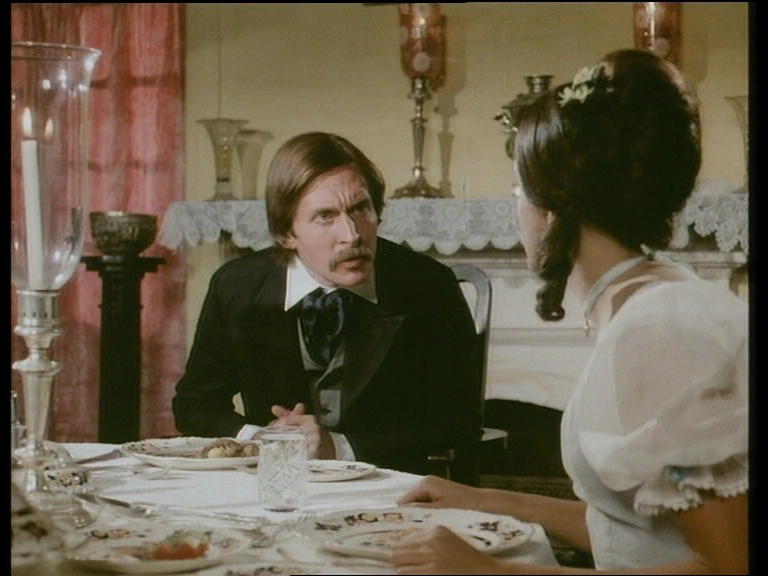 Tom Alter's an interesting guy overall.
Tom Alter's an interesting guy overall.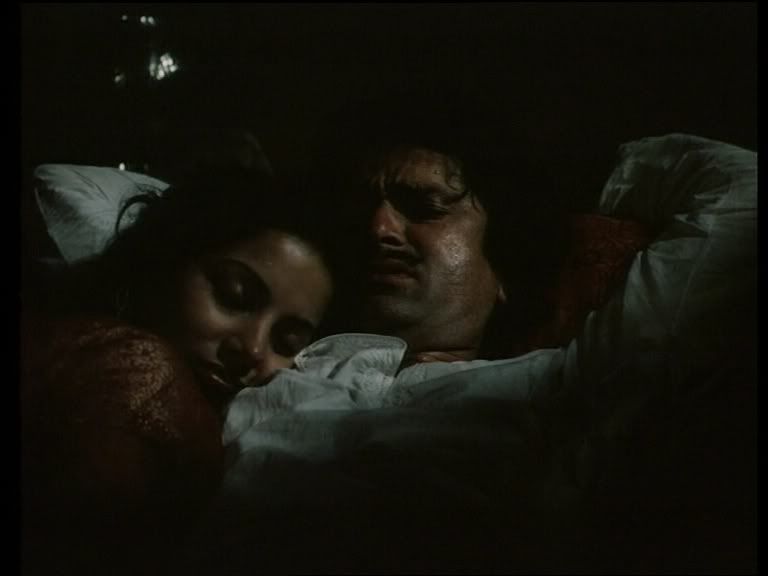 We love short scenes with little context, like this one.
We love short scenes with little context, like this one.
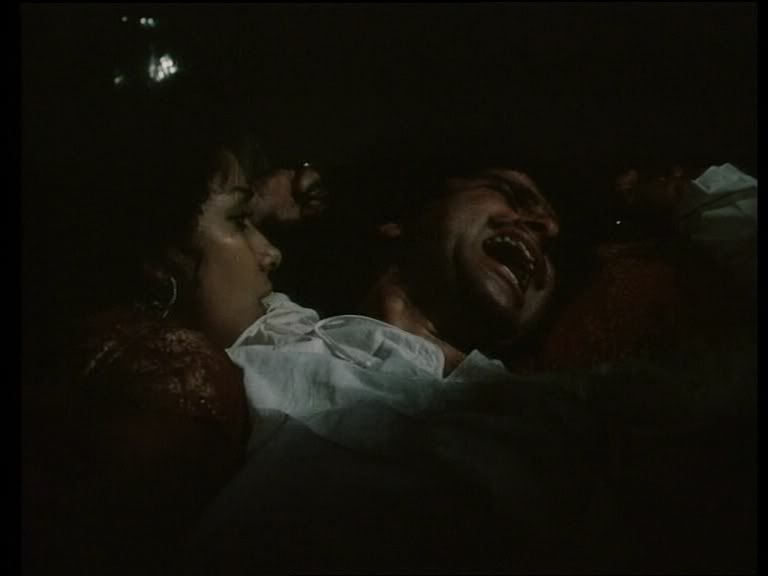
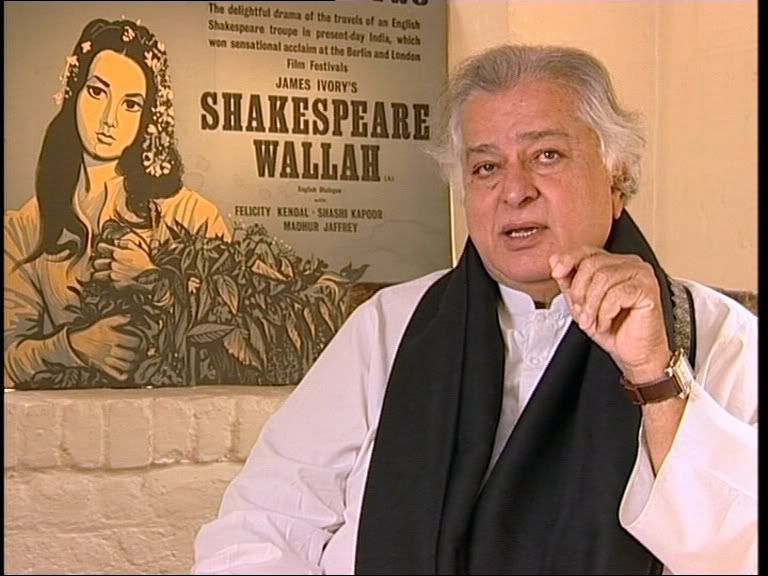 Bonus on UK copies of Junoon!
Bonus on UK copies of Junoon!

11 comments:
*furtive whisper* I too found Junoon BORING...its impeccable pedigree notwithstanding, I could not take much interest in it although I did make it through in one sitting.
Also *looks around nervously* I don't really like Shyam Benegal in general.
I watched this because Boman decided that I look like Nafisa Ali---which I don't---and roped in other people on the BKB set to concur. So I was curious. But he was wrong.
Ooooh! *claps hands and jumps* but I do love a good ploughman's lunch!!!! cheddar! pickles!! beer!!!
I loved Jennifer Kendal's performance in this sooooooo much. It made me angry that she didn't work in more films.
Over almost a year of living in the UK, I've never had a ploughman's lunch! But now I want one. Cheddar good. Onions good. Beer good.
All this talk of English food would really tick off Sarfaraz. So quick, let me add that I also really like...um...what's the Indian equivalent of a ploughman's lunch? I hope it involves naan.
I am green with envy. My DVD of Junoon didnt come with any extras let alone a posh-British-accent-English-speaking Shashi. Nehaflix has shortchanged me!!! :(
There is a more recent interview of his with Arnab Goswami on Frankly Speaking. He seems to have given up the plummy accent for a more Hindustani flavor these days and wont even admit to ever being good looking!!!
Hey, when you say all the Muslims were badly portrayed in the movie, you are forgetting Javed's aunt (Sushma Seth) and his cousins (Jalal Agha, Benjamin Gilani and Deepti Naval) who were shown to be sympathetic and tried to reduce the tension between Javed, his wife and his prisoners. Besides, Javed for all his villainy doesnt once try to enforce his will on his prisoners - isnt that grey?
Needless to say, I loved this movie. Guess its a matter of perspective, too. Most of Indian history, literature and movies (that I have come across) portray the British as evil incarnate whereas British literature portrays Indian as heathens needing civilizing. So,it was refreshing to find a movie that is willing to give a more balanced view of a turbulent period in Indian history.
Memsaab - Compliments from Boman!? For the love of God, next you'll tell me he gave you a back rub and then you guys went to see a dance performance. I'm so jealous! And Nafisa is very pretty, it's a nice ocmpliment!
Memsaab2 - I KNOW. I have developed a bit of an obsession with the Ploughman's. It is the king of meals.
Beth - Oh dear, you're right. And I didn't mean to be so ironical! If the naan is Peshawari, it has my name on it.
Bollyviewer - GASP! More Shashi - thank you for the link!
Hmm, very good points re: both the supporting characters and Javed's inaction. I'd still say the air of hostility is generally maintained, though there is that wonderful scene where the women relax at the swing. And indeed, Javed is a lot of bark and no bite, with lots of roiling conflict underneath etc. I think the film is certainly very good, and I may have given the impression that I found it oversimplified, which I didn't on the whole. I guess I just had trouble connecting with it on an emotional level (probably because of ignorance - there was so much stuff that I missed or read about afterwards and went, "ooh..."!), and so, for the review, I was wondering aloud if there were any provocative/interesting themes to explore from a largely ignorant POV.
Ahhh... watching the Shashi interview now...! Lovin' it! OMG they bring up Shashi/Rekha - one of my fave pairings! Aah!
Whenever I see the word Junoon, I always think of that song from Rocky with Zayeed Khan's hair blowing around in the wind and Zayeed Khan on a motorcycle - which seems to be a more entertaining association than this film.
Interesting point on Said's Orientalism - Occidentalism is a popular theme in Bollywood. (And The Darjeeling Limited's use of the (Canadian-)Indians was pretty terrible.
Good point, Filmi Girl. The Occidentalizing streak is really fun to track down. Jewel Thief has some pretty good examples.
Y is it that the older he gets, the more I love Shashi?!! He is handsomest to me in Kabhi Kabhi, and even that small lil scene in Ijazat, and in ur last pic he is just so so adorable.
Its terrible he and Jen didnt make more movies together ...
Also love to hate Naseer here- that man could do bad really good- love him in Mirch masala- but im going off on a tangent again...:D
Beth - Jewel Thief has the ultimate Occidentalism in a glitter leotard: HELEN!
I love any scenes showing "office work" where the writers clearly had no idea what goes on in a typical office - like Shammi in Junglee. Ah, the business of business.......
Junoon is a nice movie to watch.I think Sashi gave a fabulous performance.
Filmi Girl - Very true! I think the worst Occidentalist might be Karan Johar. Every film of his finds some way to ridicule/undermine the West, particularly England. I always ask, "Why, Karan?! WHY?!" I think he might be trying to distance himself from too much Westphilia, considering his films have been criticized for being too NRI-heavy.
Beth - And who could forget Shashi's horrible monologue at the end of Jab Jab Phool Khile?! Where even using forks and knives looks constrictive and colonial!
Shweta - Aww, I'm starting to grow incredibly fond of an older Shashi as well. At least, the two interviews (in the Junoon DVD and the one posted by Bollyviewer in the above comment) of him present such a likable, charming guy that I'm like, "OMG the real Shashi Kapoor is awesome too!" It's even made me start to feel bad about objectifying him so much.
Naseer is wonderful as a baddie, though, because I'm schoolgirlish in my movie watching, I want him to be good so much! Hence why I couldn't stand him in Mirch Masala, ironically - if he has no humanity, I start to despair!
Filmi Girl - LOL, excellent point! If someone was really clever, they'd make a post on these crazily unrealistic office scenes. I have a soft spot for Trishul, which features ample moments of Sanjeev and Shashi ordering around random peons and then sitting at their desks with steepled fingers.
Crazy on Bollywood - Yeah, Shashi's performance was wonderful! Especially since it was so different from the other stuff he was doing at the time (Suhaag, etc.). I can't wait to see Vijeta now!
Post a Comment